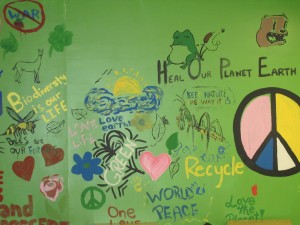 A book by American scientist, Rachel Carson, entitled Silent Spring, was published in 1962 and literally changed the world. I always associate that book and its subsequent impact with the birth of the modern environmental movement. It identified significant health hazards for birds and humans resulting from the wide use of pesticides. Essentially, it laid the groundwork for the eventual banning of a harmful chemical called DDT. In the late 1960s, along with the anti-nuclear movement, the ecological movement became a political force for the first time.
A book by American scientist, Rachel Carson, entitled Silent Spring, was published in 1962 and literally changed the world. I always associate that book and its subsequent impact with the birth of the modern environmental movement. It identified significant health hazards for birds and humans resulting from the wide use of pesticides. Essentially, it laid the groundwork for the eventual banning of a harmful chemical called DDT. In the late 1960s, along with the anti-nuclear movement, the ecological movement became a political force for the first time.
In 1971, the private interest group Greenpeace was born in a kitchen in Vancouver, as was the new federal government agency, Environment Canada. That was one year after the USA created the EPA – the Environmental Protection Agency.
Over the past decade here at LCC, we have made a concerted effort as a community to be mindful of our environmental impact and be a more sustainable school. It begins with teaching about environmental responsibility and sustainable practices in various classes while simultaneously implementing sustainable practices in the operation of our facilities. This has ranged from installing high efficiency furnaces in the main school, a geothermal heating system in the new Assaly Arts building, to installing efficient lighting and taps and urinals in washrooms to save water. Our arena is now distinguished for its green technology that sets it apart from most other rinks in Montreal.
Even our turf field was put in two summers ago with sustainability in mind. No, it is not natural grass, but we first completed a detailed environmental impact analysis prior to deciding about its installation. The turf was actually deemed environmentally neutral by a respected environmental consultant. Yes, it’s an artificial product, but it has helped eliminate significant busing of students to the West Island for spring practices, and has massively reduced water and fertilizer requirements necessary with natural grass. In the end, we are operating a high-traffic outdoor facility. We have gained weeks of field time we didn’t have on the shoulder seasons of late fall and early spring, when grass is actually unusable.
I think that improving the state of our environment is an overwhelming question for many students. They get confused by the abstract nature of “environmentalism” and what that actually means. Some tend to wonder: “What can I do at the individual level to have any positive impact?”
It’s a good question. However, as Zia Tong, keynote speaker at the recent LCC Destiny Québec Conference and host of the national Science TV show Daily Planet noted, there is actually lots students can do. She asked student delegates to consider the ethical, moral, social, economic and environmental issues related to our throwaway culture. She urged us all to stop being what she called “suckers” for buying new things all the time – like phones – essentially just because they changed their shape, when our current phone works fine.
Yes, there’s a lot one can do to protect the environment. Where possible, choose locally- sourced food products that eliminate the impact of long distance travel and emissions, walk more, use public transit, limit showers to four minutes, use high efficiency light bulbs, buy eco-friendly products, and the list goes on and on. And, of course, we can try to live by the credo “reduce, reuse, recycle”. Simply commit to personal eco-practices that diminish harmful impact on our environment, one person at a time.
My thanks to Math teacher and “eco-warrior” Ms. Scattolin and the student Green Team for educating us and advocating for green practices in our community. Thanks also to all teachers who address sustainability in a creative way in the classroom. Yes, here at LCC we do some things well on the sustainability front, but by making thoughtful choices, we can always do better.
The older I get, and the more I travel outside of Canada where environmental degradation is often more visible and pressing, the more I feel thankful for the natural beauty and extraordinary, unspoiled resources we have in this blessed country. Let’s all commit to respect, steward and protect our environment. It’s our only planet and it is, indeed, very precious!
Christopher Shannon
Headmaster
